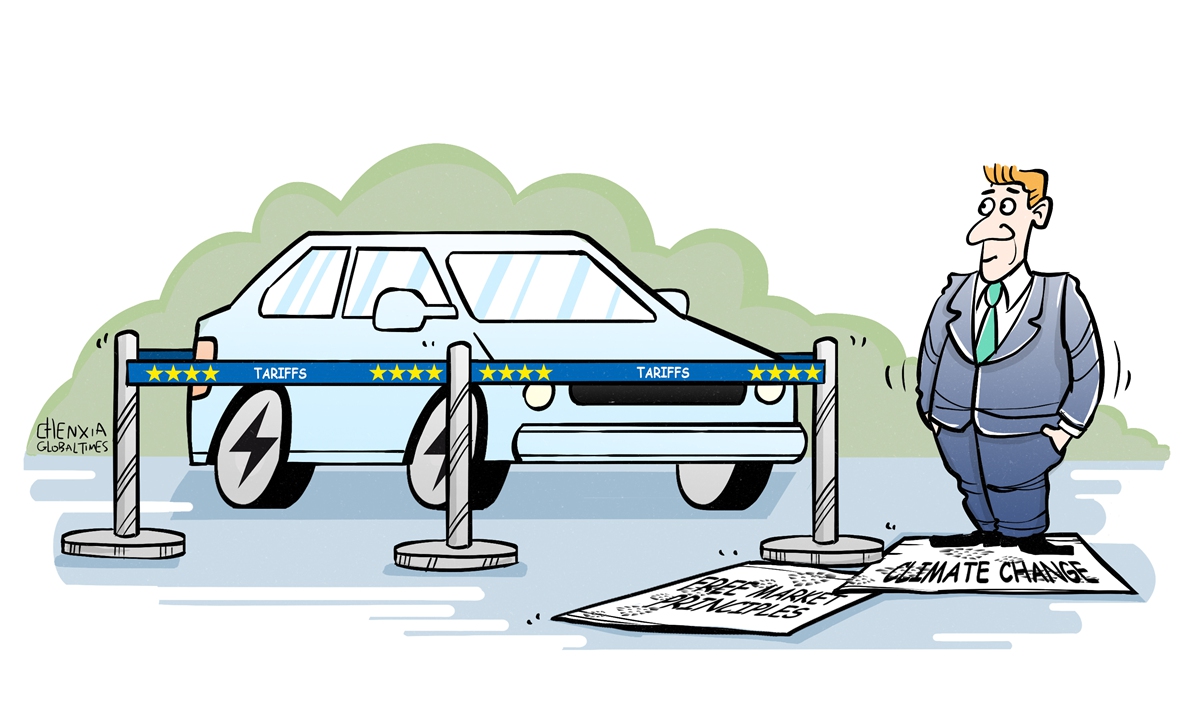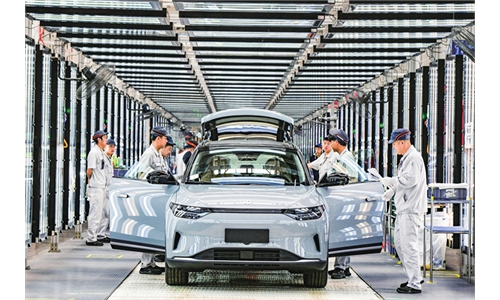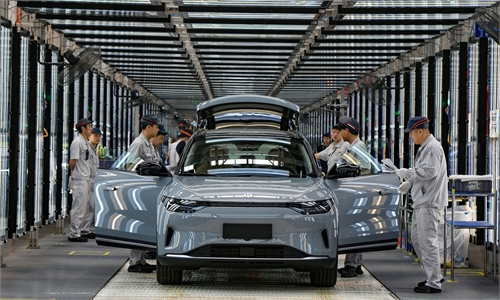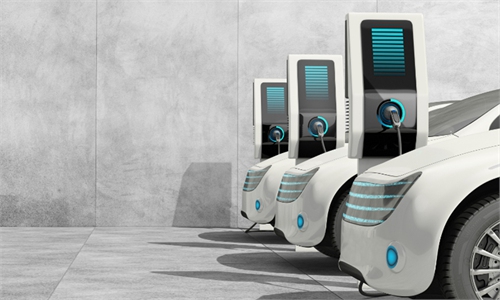
Illustration: Chen Xia/GT
The additional tariffs of between 17.4 percent and 38.1 percent announced by the EU on imported Chinese electric vehicles (EVs) recently, on top of the 10-percent duty already imposed by the bloc, are creating problems for China-Europe relations, as the elevated provisional duties will hinder Chinese EV makers, leading them to raise prices for European customers. The EU's move is uncooperative and discriminatory, signaling discord and friction between the world's two major economic powers.The result of the extra tariffs is that Chinese-made green EVs will become more expensive to buy in Europe. By undercutting the affordability of Chinese EVs, European consumers will face a much higher financial burden to replace their gasoline guzzlers with zero-emission EVs. The high tariffs will, undoubtedly, slow down Europe's low-carbon transition, as scientists claim road transportation saddled with tail-gas-fuming cars and trucks accounts for one sixth of global carbon dioxide emissions.
In 2023, China sold over 8.8 million EVs and plug-in hybrid cars, while only around two million were sold in the EU countries. Now, the EV penetration in China is nearing 40 percent, compared to Europe's 14.5 percent. With the EU's new extra tariffs to be imposed on Chinese EVs, that gap will only expand. In May, S&P Global released a report revealing EV sales in Europe and North America have slowed in the past 12 months amid higher prices and concerns about recharge capability, but China's EV growth momentum continues.
It's logical to say that the EU's latest decision to levy extra import duties on Chinese EVs is reneging on Europe's long-held promise to control climate change and mitigate "global warming" or "global boiling" as our living planet is being scorched by one heat wave after another. By slowing down Europe's low-carbon transition, European leaders are making a serious mistake.
The European Commission (EC), the EU's executive body, initiated a probe into Chinese EV makers in October 2023. The reason the "anti-subsidy" investigation was started by the EC but not triggered by complaints from European automakers is not difficult to fathom. The probe was politically oriented and influenced by the US' anti-China policies.
US politicians claim that China's rapid rise in EV manufacturing and other green-tech innovation poses a national security threat to America. Earlier this year, the Biden administration, in an effort to curb China's economic growth, increased tariffs on EVs from China from 25 percent to 100 percent. This significant tariff increase has essentially blocked Chinese EVs from entering the US market, leading to criticism and mockery from American consumers. One comment reads, "Cannot compete with Chinese EV makers? Biden raises the duties."
Will the protectionist high tariffs adopted by the EU and the US hammer or knock down Chinese EV companies? It's highly unlikely. Chinese EV makers are way ahead in the world in green-tech research and innovation, particularly when it comes to developing long-range EV batteries. China also has a massive domestic market, where vast consumers are conscious of global warming, eager to replace gasoline-fueled dirty cars with EVs. Besides, China's increasingly high-quality and affordable EVs are being imported to many developing countries in Asia, Africa and South America.
Stuck in a protectionism mind-set, the EU and the US will only push up the prices of EVs on their markets, which will perpetuate "sticky inflation" there.
Realizing these risks, Germany is leading a group of EU countries opposing the tariffs. German Chancellor Olaf Scholz has said that imposing high duties will "ultimately just makes everything more expensive, and everyone poorer." His reasoning is right, but other short-sighted politicians in Europe have been knowingly oblivious.
Some analysts say that the EU's imposing extra duties is purposefully to pressure China's leading EV makers to set up assembly plants and create jobs in Europe. Will the high levies hasten EV localization in the EU? It's possible. But it is against the common business norms and publicly accepted ethics to force Chinese EV makers to set up operations in Europe by raising extra tariffs.
EU tariffs represent overt discrimination against Chinese-made EVs. China's Commerce Ministry has denounced the tariffs as "blatant protectionism" that lacks a factual or legal basis. The ministry has not specified how it will retaliate, but emphasized that China will "take every necessary measure" to safeguard the interests of Chinese companies. There are also sources saying that China could lodge a complaint at the WTO for a legal settlement.
Following the tariffs announcement, European officials say they won't rule out a negotiated agreement with China before the duties become permanent in November this year.
A negotiated deal that is acceptable to both sides is the best scenario, because China and EU, as the world's two major economies, are obliged to avoid a full-blown and damaging trade war. As German Chancellor Scholz said, the two economies, complementary as they are, should cooperate and avoid "making everyone poorer" through raising trade barriers.
However, if no deal is reached in the negotiations and the EU's proposed 17.4-38.1 extra tariffs become permanent, some retaliatory measures should be implemented by China. The reprisal could be measured and specifically targeted.
By all metrics, the EU's levying extra tariffs on Chinese EVs is creating a stumbling block between the two major economies and hurting Europe's green transition. The tariffs' deleterious effect on both economies is what the US wants to see. It's better for trade officials from Brussels and Beijing to sit down and defuse the tensions through candid talks and return to the right track of pursuing win-win trade, and avoiding lose-lose battles.
The author is an editor with the Global Times. bizopinion@globaltimes.com.cn



